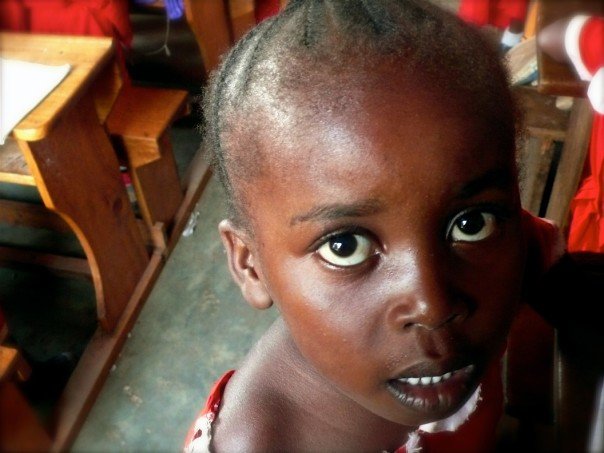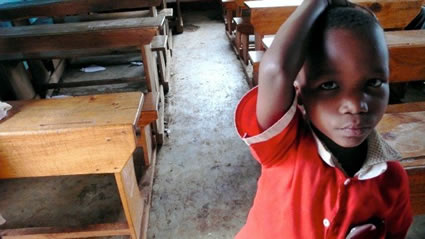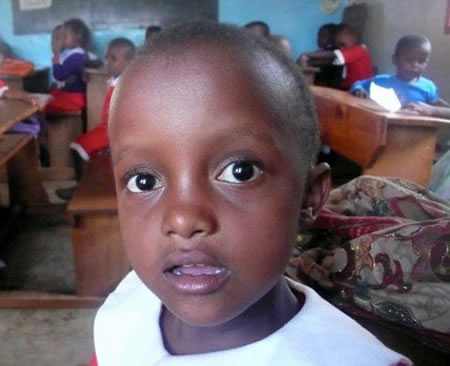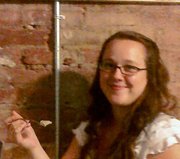The Switch: Part 1
by Mary Schaller
Her name means Happiness. I look it up on the guesthouse computer, because everyone's name in Tanzania means something and I want to know what hers means. When I find it (Furaha: Happiness), I choke on a laugh and call Max over from across the compound.
"Yeah right. She gets high off being angry!"
"I know!"
"Look up the Swahili for Child Abuser."
"It's not that bad!"
"Okay, then. Look up the Swahili for Bitch."
We lean over the computer, and it bleaches our skin bluer and lighter than it is already.
"Kuma Mamako. Miss Kuma Mamako!"
"God, she's a kuma mamako," Max says, before patting me on the shoulder and going to shower.
The first day, the children wore wrinkled and dirty red cotton uniforms. The boys wore button-down shirts and shorts that exposed their dry, dusty knees. The girls wore dresses with white smocks. They ran, flying along with the van, leaping over potholes and chickens and tires. Some tried to stick their fingers in the window, but our driver Joseph scolded them. "Mzungu! Mzungu!" White person! White person!
"Wazungu!" White people!
"Teachah! Teachah!"
"Hello, how are you I am fine!"
"Hello! How old are you I am six!"
"Mzungu!"
I smiled and I sweated and I shrunk back into my seat. I felt like a Beatle. I stuck a hand out the window and it was high-fived by a little girl with her hair in cornrows finished with white beads.
"Mzungu! Mambo vipi mzungu? Good morning, good evening, I am fine!"
Max looked at me and raised his eyebrows. Sweat was pooling above his lip, beading on his stubble.
"So I guess they noticed we're white?" he said, shrugging. I laughed and he laughed and I was grateful we were partners.
"Here we are," Joseph said, stopping the van. The building was cinderblock and had a tin roof and it was painted sky blue and forest green.
"So do we just go in?" I asked him.
"Yes. Kwaheri!"
Kids instantly seized my hands, three on my right and two on my left and they pulled me toward the school. I looked behind me and they were doing the same thing to Max. I asked them their names, and they looked up at me with wide eyes and they responded in high-pitched voices, fast and layered on top of each other. I missed each and every name. I was smiling so much my face hurt, a deep aching in the cheeks, and I was scared, so scared. I wanted to get under one of the little wooden desks and fold in on myself like a snail. A slug in a shell; a girl in a desk. Furaha was nice the first day. She called us by our names. She shook our hands (slack grip, her fingertips tickled my wrist) wrote our names on the board. Her handwriting looked different, more European than ours, with extra curlicues and tails. Danica. Max.

"Class!" she shouted. The kids sat up straight, heads hovering above their thin bodies like balloons. "These are your new teachers! Mister Max and Miss Danica. Say hello."
"Hello!"
"Say Hello, Mister Max."
"Hello, Meestah Max!"
"Say Hello, Miss Danica!"
"Hello, Mees Danna!"
I could feel sweat behind my knees and it unfurled down my calf. The kids were looking at me like I was a talisman, like I was enchanted, like I was a goddess.
Furaha led the kids through the national anthem and a welcome song. They sang with their chins up and their heads back, like hungry baby birds.
"Okay," Furaha said to Max and me, "Now you teach."
We don't make lesson plans, not really. We mean to, start each day with good intentions, but we get lost in the day, our brains melting in our skulls. We nap and we hang out with the other volunteers and drink Tusker beers under the awning of Deo's shop. We play cards (Go Fish, Bullshit, Gin Rummy, a game called Golf) and we read books. We buy textiles. We eat fried bread and then when we get full we sit around for an hour or so and then we eat more fried bread. But some nights we feel responsible and so we sit at the plastic dining tables and actually try to draft a lesson plan.
"Should we teach them letters again?" I ask.
"Yeah, sure, we did math today, right? I don't even remember."
"Yeah, I think so? I don't remember either! Wait, yeah, we did math because remember? Iddi got 2+3=5?"
"Yes!"
"Okay, so letters."
"Want to just do the whole 'A-is-for-Apple' thing again?"
"Sure."
We teach addition and subtraction and A-is-for-Apple. Sometimes we teach complete English vocabulary using clichéd African animals.
"And the English word for Tembo is? Elephant! Say 'Elephant!'"
After the first day, Furaha has a switch. I think that's what they call them, sticks for hitting people. I picture southerners with thick accents calling it a switch, like "Oh, Papa's gonna get me with his switch." So, she has this stick, and it's sharp and pointed and it makes this twang! when she snaps it against the desk. She peels back the barky outer skin so it's ripe and green and splintery. I look at Max like why does she have that? And he looks back like you idiot, it's to hit the kids with.
Furaha has a switch and she no longer calls us by our names. She calls us Mr. and Miss. Mzungu. Mr. and Miss. White Person. She sits at the teacher's desk in the front of the room and she laughs when we make mistakes, and she is just omnipresent, breathing down our necks and laughing her high, meaty laugh. She turns to the boys in the front row (Musa, Juma, Alhamidi) and gestures us and says something in Swahili. The boys laugh and say ndiyo, yes.
We see Furaha use the switch for the first time when Aisha gets a math problem wrong. 1+3 does not equal 5. So Furaha calmly asks Aisha for her hand and then she snaps the switch against it one, two, three, four times. 1+3=4.
One day, Max is sick. It is just me and Furaha and the class. At recess, Furaha waves me over. She claps her hand at me and invites me to her house for lunch. I look at her hands, at her rusty red fingernails and the henna designs crawling up her dark arms like vines. I am cautious to follow Miss Kuma Mamako, but I do it anyway, to be polite. Her house is down a muddy alley behind the school. The houses are made of packed mud with glassless windows and newspaper curtains. Furaha walks a few steps ahead of me and she occasionally looks back over her shoulder and smirks at me, like I amuse her and she is a little embarrassed to be seen with me. Her mouth turns up at the corner and looks like a comma turned on its side. My skirt drags against the mud, and my shoes get sucked deeper, but I chase Furaha past cooking stalls and window fronts selling flour and laundry detergent.
 |

"Here. We are here. Karibu." Welcome. She peels back her fabric door (a kanga catching the wind, billowing out like the skirt of a dervish). It is dark and wet and warm inside, and I can't see anything and it smells like soil, like making mud pies in the summer.
My eyes start to adjust, black giving way to a veil of neon green, and then I see the room. It is tiny and she has a small couch against the far wall and a shelf with a few Arabic and Swahili books. She has a white plastic table (the kind North Americans keep on their back porches) covered in a torn swath of fabric and a radio with a peeling strip of duct tape holding the batteries in.
"Sit," says Furaha, gesturing toward the couch. I feel like one of our students, looking up into her round eyes and following her commands. She picks up a thermos of sweet chai and fills two dirty white plastic cups. She hands one to me, and as I reach for it my fingertip brushes her nail.
"Asante."
"You're welcome."
Furaha keeps looking at me, she looks at my face for a while. It scares me, the way she is looking at me. Furaha does everything with intensity. Even in her silence, she is loud. I can't look at her anymore, so I look away, to the dirt floor. She looks down too, and she swallows.
"How old are you?" She asks me.
"Eighteen," I respond, and I know that that is both old and young, and above all, I know that it is inadequate. I want to ask Furaha how old she is. The first day I respectfully said "shikamoo" to her and she laughed and told me she is too young for that.
"I am twenty-two," she says, "ishirini na mbili. You are kumi na nane." She stares at me, right in the eye, and I feel like she is tying a net around me. Her gaze is sharp and strong and when I can't stand her looking at me anymore, she laughs.
"You are very funny." She says. My mouth falls open, and I quickly close it.
"I'm not funny!"
"Funny is not a bad thing, mzungu."
"But I think you mean it as a bad thing."
"I do not. You are funny."
"Okay."
"Are you hungry?" Furaha asks, standing and walking toward a plastic container of mandazi.
"Oh no, it's okay."
"No, you are hungry." Furaha places two mandazi on a torn page of newspaper. The headline is something about dead babies found behind a hospital in Dar Es Salaam. I show her.
"Oh, I do not read it," says Furhaha, "I just use that newspaper to eat mandazi off of. Babies die! How is that news?"
"I guess so."
"You like mandazi?"
"Yes! At home we have something like them called doughnuts. Police officers eat them." "Police officers eat mandazi too." We chew our fried bread. Furaha softens somehow in her own house. I can hear her saliva as she chews, and she becomes smaller, she becomes someone I could know.
"What made you become a teacher?"
"I wanted to have money. It is the only thing I can do." She smacks her palms together, dispersing mandazi crumbs into the dusty air. I nod.
"And also," she continues, "I want to not be controlled. I want no one to control me. The only way to not be controlled is money. So I have it, I make money. I am a teacher. I do not like school though. But it is important. Why are you a teacher, Miss Mzungu?"
"Why do you not call me my name?" I ask, and I regret it, I regret it fast. I want to catch it with a lizard tongue, pull it back inside me where it can rot and grow cobwebs.
"Well, you are not the first Miss Mzungu and you will not be the last. That is all. Don't get offended, Miss Mzungu."
"I am not offended."
"You are."
"Well, I want you to like me."
"I like you."
"I don't think you do."
"You are here, aren't you? I do not bring the other Misses Mzungu here. But you do not answer my question. Why are you a teacher?"
"Well, I'm not," I say, "I'm just a volunteer."
"But you're teaching. You teach more than I teach."
"I guess I came because I wanted to help," I say, and I look up at her and this time her eyes don't scare me. They're capable, is all. They aren't violent. They are a little scared, and they thank me for coming and they say That's Enough.

I come home that day and Max is lying in bed, his face slick and tinged a wet seafoam green.
"You don't look good," I say, tapping his knee.
"Well I feel like shit," he says, laughing a little.
"Did Joseph take you to the hospital?" I ask.
"Yeah, they said I have an amoeba? I was sort of like ew, that's really gross but then I figured it's a pretty cool story to tell. Like when people ask What did you get in Tanzania? I can say, An amoeba!"
"Like a battle scar?"
"Exactly. But it was pretty gnarly, they had me shit in a tiny container, and I was really worried I'd –"
"Ew, Max, that's enough."
"How was school?"
"It was good. I had lunch with Miss Furaha."
"Oh god! How was it? Did she whip you with her switch?"
"Oh come on, no! It was nice, actually. We went to her house. She wasn't as scary as I thought."
"Are you getting soft on me?"
"I'm not getting soft! If anything, I'm getting hard. And why waste all that time hating her? We took her job, Max!"
"Who cares, she gets paid. If someone came into my work and did my job while all I had to do is sit and watch, well I'd be pretty happy about it."
Max misses school for a week.

Mary Schaller graduated in 2006 from Cape Cod Academy, then spent a "gap year" volunteering both in a Guatemalan orphanage, and a school in Tanzania. She is a recent recipient of a BA in International Development from McGill University in Montreal.
Mary won First Place for the Chester Macnaghten prize in Creative Writing, awarded by McGill University for The Switch -this story is fiction, based on her real life experiences in Tanzania.
Mary lives with her sister in Seattle, WA, as she pursues a career with refugees while continuing to embrace her love of writing--and often visits her parents in the Web Princess palace.
